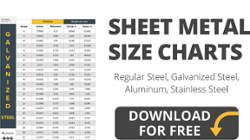Marine grade metals are specially treated to withstand use in water or wet environments. Usually, this is done by adding special alloys to the metal to make it corrosion-resistant. Most metals, such as aluminum, have marine grades.
Structural steel is the traditional material used in the shipbuilding industry due to its excellent mechanical properties and low manufacturing costs. However, the increasing demand for larger, yet light ships made designers search for alternative materials. Aluminum alloys were a great choice because they provided high corrosion resistance, weighed less, and were considered economical in the long run.
Types of Marine Grade Aluminum Alloys
Aluminum alloys are generally classified according to the primary alloying element added to aluminum and the alloys' ability to respond to thermal and mechanical treatment. Cast aluminum alloys are formed by pouring molten liquid metal into molds of requisite shapes and cooled; solid metal is mechanically deformed or forged or rolled to the required shape to form wrought aluminum alloys.
Marine grade wrought aluminum alloys usually comprise aluminum-magnesium (Al-Mg) alloys and aluminum-magnesium-silicon (Al-Mg-Si) alloys. They are generally used in structural shipbuilding, boat lifts, docks, and other offshore structural applications.
Cast aluminum alloys are used in numerous marine applications because casting processes can create relatively complex shapes, including ships' superstructures, structural components, interior fixtures and various supports. They are usually aluminum-silicon (Al-Si) or Al-Mg alloys.
Characteristics of Marine Grade Aluminum Alloys
The marine industry uses aluminum alloys for shipbuilding and fabricating components in offshore platforms because they are lightweight, corrosion-resistant, and have superior mechanical properties.
The following are some examples of cast aluminum alloys, their characteristics and uses:
Al-Si alloys (examples 413.0, 443.0):
- highly fluid, castable and weldable
- corrosion-resistant
- moderately strong
- great for leak- and fatigue-resistant castings
- used in critical components in marine applications
Al-Mg alloys (examples 512.0, 514.0, 518.0, 535.0):
- not heat treatable
- tougher to cast
- machinable
- highly corrosion-resistant
- suitable for components exposed to seawater
Some characteristics and uses of wrought aluminum alloys are as follows:
Al-Mg alloys (examples 5052, 5083, 5754):
- non-heat treatable
- strain hardenable
- easily weldable
- highly corrosion-resistant, even in salt water
- tough, even at cryogenic temperatures
- moderately strong
Al-Mg-Si alloys (examples 6061, 6063, 6111):
- heat treatable
- extrudable
- highly corrosion-resistant
- moderately strong
Watercraft made from aluminum alloys have high speeds, longer lives, lower maintenance costs, greater payloads, and higher recycle values. Designers, who are proactive about corrosion control and wish to avoid maintenance and safety issues, prefer using marine grade aluminum.


